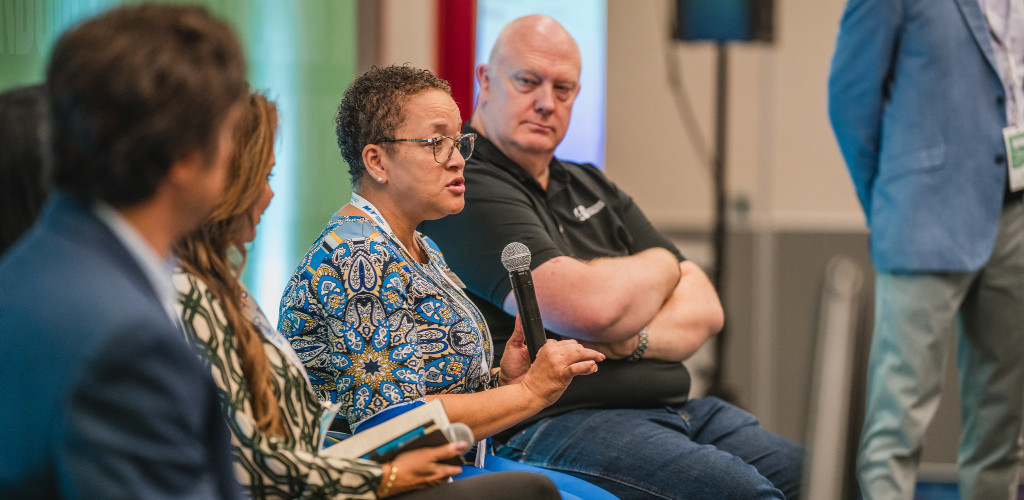Executives Share Wisdom with Students Mulling Career in Shipping, Logistics
 By Alex Keimig
By Alex Keimig
Breakbulk Americas 2023: Breakbulk industry professionals are in greater demand now than perhaps ever before, as our interconnected world continues to grow, shift, and innovate.
With a new generation of shipping and logistics professionals poised to take the stage, key industry players in Houston offered their wisdom and answered questions about the myriad opportunities of a career in breakbulk.
According to Jacquie Young-Hall, maritime education outreach manager at Port Houston, preparing for a career in breakbulk doesn’t start with degree in hand, or even when choosing a college major; it starts much earlier than that.
“At Port Houston, we have an initiative to work with local K through 12th Grade, as well as our college and university students, to try to get them to understand how relevant and important the port is to our region. We work very diligently with our academic partners, our industry partners, and our federal and our corporate partners so that what you’re being taught in school is relevant to what the industry is needing,” Young-Hall said.
Port Houston’s student initiatives may be opening doors, but Young-Hall also emphasized the importance of individual research and networking when considering a career in breakbulk.
“You have to get out of your comfort zone. You have to ask questions. There is no such thing as a dumb question. The only dumb question is the question you don’t ask. Look to the class graduating before you and see what they’re doing, where they’re at, perhaps how they can help you become part of a student or professional organization. You really have to get out there and figure out what it is you want to learn and know and do,” she said.
.jpg) While there is no shortage of breakbulk and logistics-related careers to meet demand, panelists also stressed the importance of networking and mentorship to help young professionals find their footing and successfully navigate their various options.
While there is no shortage of breakbulk and logistics-related careers to meet demand, panelists also stressed the importance of networking and mentorship to help young professionals find their footing and successfully navigate their various options.
“The fact that you all are here today speaks volumes, because this is a very good network where you’ll get to know the people and the companies you might be interested in,” said Esmeralda Smith-Garcia, director of business development for Global Projects/Industry Solutions at DB Schenker.
“There are all sorts of different opportunities as far as networking. There’s the International Transportation Maritime Association; we have Women in Breakbulk; we have all of these different networking opportunities that are good for you all to help you venture out, get to know people, get to know the various types of logistics and breakbulk opportunities that are out there. It is so crucial for you to get out and get the exposure that you need.”
Maria Alvarez, logistics lead at Bechtel Corporation agreed: “It’s very important to reach out to someone senior, even if they’re just within your own company or community, to see about cultivating that mentor-mentee relationship,” she said.
“You’ll be surprised how many people will be willing and happy to do that.”
For young people who have already found their passion in breakbulk and may be researching or applying for positions, Thiago Aracema, global sector head, EPC Americas, at DHL Global Forwarding, recommended doing plenty of research leading up to an interview.
“When it comes to applying and interviewing for jobs, do your research. Try to understand the job you’re going for, what the company does, what marketplace that they play in. Who are the competitors, who are their clients, what are they looking for, what kind of solutions do they offer? Use that to build your case and illustrate your value to the people you’re interviewing with. Find your competitive advantage – something that only you have – that sets you apart from the rest,” he said.
Thomas Skellingsted, president of 4D Supply Chain Consulting, made clear, however, that change and transition are natural experiences for any field, and that they also provide excellent opportunities for growth and learning.
“When you interview for your first role in the industry, that first job may not be the last job. There’s a very good chance that you’re going to have a few different jobs over the years – especially in the first seven years. When we look at students graduating between 2018 and 2023, we see that many of them will average three different roles in their first five to seven years in the job market, so don’t think that the job you first apply for is the end-all, be-all job.
“The point is to get into the industry, gain knowledge, and gain experience that’s relevant and transferrable to other potential roles in the field. That’s the most important thing for you to think about when you're applying for jobs: ask yourself if this role is going to allow you to grow and gain knowledge and experience in the industry.”
Smith-Garcia offered similar wisdom in closing: “Continue what you’re doing: get your education, and then continue your education. Your work can only get better from there.”
The session was moderated by Phillip Brown, vice president of projects for the Jumbo-SAL-Alliance.
Check out highlights from this year's Education Day in Houston:
